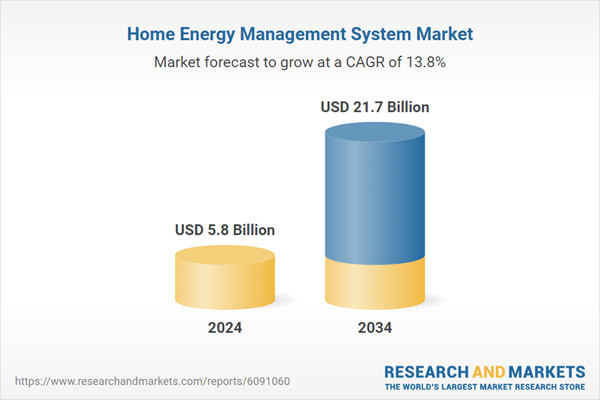Government programs and regulations promoting energy efficiency have also played a pivotal role in accelerating the adoption of home energy management solutions. Various incentives and rebates offered by governments worldwide encourage consumers to invest in energy-saving technologies. Stringent energy usage regulations, coupled with ambitious climate targets, are pushing consumers toward investing in smart home solutions that optimize energy consumption.
The home energy management system market was valued at USD 5.8 billion by 2024. Rising utility prices and increasing environmental concerns motivate consumers to seek alternatives that reduce energy costs and carbon footprint. The growing integration of smart devices such as thermostats, lighting systems, and electric vehicle (EV) chargers into homes accelerates the adoption of HEMS. As the demand for energy efficiency continues to rise, more households are adopting smart home technologies.
The programmable communicating thermostat segment is anticipated to drive substantial growth, expanding at a CAGR of 12.7% through 2034. These thermostats are designed with advanced features like preset scheduling, remote temperature adjustments, and real-time monitoring, which significantly reduce energy consumption and lower utility bills. As a result, they are becoming increasingly popular among consumers who are prioritizing sustainability and cost efficiency. By allowing homeowners to have better control over their home’s heating and cooling systems, these devices optimize energy use, making them an integral part of the growing trend toward energy-efficient homes.
United States Home Energy Management System Market reached USD 1.1 billion in 2024 and is poised for continued growth due to the widespread adoption of smart home technologies is creating a solid foundation for the HEMS market as consumers increasingly seek interconnected solutions to manage their home’s energy use more effectively. Smart thermostats, lighting controls, and other IoT-enabled devices are seamlessly integrated into centralized energy management systems, offering users real-time control over their energy consumption.
Major companies in the Global Home Energy Management System Market include Siemens, Toshiba, Honeywell, Schneider Electric, and Johnson Controls. These companies are focusing on innovations in smart technologies, customer engagement strategies, and strategic partnerships to strengthen their presence in the market. Many companies are also investing in sustainable solutions and expanding their product portfolios to meet the growing demand for energy-efficient home management systems. Additionally, strategic mergers, acquisitions, and collaborations are common strategies to expand market reach and enhance technological capabilities.
Comprehensive Market Analysis and Forecast
- Industry trends, key growth drivers, challenges, future opportunities, and regulatory landscape
- Competitive landscape with Porter’s Five Forces and PESTEL analysis
- Market size, segmentation, and regional forecasts
- In-depth company profiles, business strategies, financial insights, and SWOT analysis
This product will be delivered within 2-4 business days.
Table of Contents
Companies Mentioned
The companies featured in this home energy management system market report include:- ABB
- Eaton
- Emerson Electric
- ENGIE Impact
- General Electric
- GridPoint
- Honeywell
- Johnson Controls
- Kenmore
- Optimum Energy
- Schneider Electric
- Siemens
- Telkonet
- Toshiba
Table Information
| Report Attribute | Details |
|---|---|
| No. of Pages | 123 |
| Published | April 2025 |
| Forecast Period | 2024 - 2034 |
| Estimated Market Value ( USD | $ 5.8 Billion |
| Forecasted Market Value ( USD | $ 21.7 Billion |
| Compound Annual Growth Rate | 13.8% |
| Regions Covered | Global |
| No. of Companies Mentioned | 15 |









